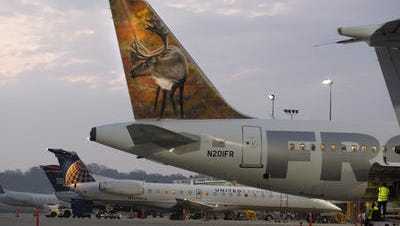CVG takes big step to end Delta dominance

Cincinnati/Northern Kentucky International Airport has officially taken its first major step toward ending Delta Air Lines' decades-long dominance over operations.
The airport and servicing airlines on Monday reached an agreement on the framework for CVG's first new contract with all carriers in more than 40 years.
The agreement has been expected for months and is a step toward finalizing a new contract, which should be completed by the end of the year. The current contract is set to expire on Dec. 31.
The new deal will be much shorter than the 1972 agreement that helped Delta establish a powerful and thriving hub at CVG. The airport and airlines have agreed the new contract will last 5 years and allow CVG to have some control over business decisions.
The deal's structure will allow for more carriers to have influence over decisions, which could lead to lowering CVG's notoriously high ticket prices. In particular, the new agreement is expected to make CVG more attractive to low-cost carriers that have feared being bullied out of the market by Delta.
"I want to applaud CVG leadership, airline partners and consultants who worked diligently for many months to come to an agreement on the new use agreement," said Bill Robinson, chairman of the board that oversees the airport.
CVG already has been gradually transitioning from a hub to a multi-carrier airport in recent years, with the addition of discount carriers Frontier Airlines and Allegiant Air. The airport also continues to try to lure low-cost carrier JetBlue Airways to start flights to Boston. The new agreement will allow CVG to offer financial incentives to try to recruit and retain airlines.
"This agreement makes a commitment to keep carrier cost stable and reasonable over the next five years, and we look forward to further building on our existing network at CVG," said Keith Hansen, Allegiant Air's director of airport planning.
The contract establishes airlines' fee structure and sets the framework for decision-making on airport capital projects. Under the current agreement, Delta has to approve almost all major decisions at CVG – even if the airport wants to purchase a new police cruiser.
Delta helped build CVG into one of the nation's busiest airports, with nearly 700 daily nonstop flights to cities big and small across the U.S. and globe. The lack of competition contributed to CVG having the most expensive ticket prices in the U.S. for years, but the flight frequency and nonstop options helped quell some fliers' frustrations over high fares.
But the airline industry completely changed in the wake the 9/11 terrorist attacks. Downsizing and mergers became the norm, and CVG felt the brunt of the industry's changing business model. Delta chose to establish its major Midwest hub in Detroit after merging with Northwest Airlines. Since 2005, Delta has cut nearly 600 flights at CVG – yet ticket prices have remained among the highest in the nation.
Despite the massive cuts, Atlanta-based Delta still considers CVG one of its nine U.S. hubs. The airline will continue to have a presence at CVG. Delta is expected to maintain a presence at CVG after this year. The airline's lease on Concourse B and half of the ticketing area does not expire until the end of 2020.
Here is a look at the framework of the new agreement, according to a release from CVG:
• Five-year term: Jan. 1, 2016 through Dec. 31, 2020. Shorter terms of 3-5 years are now the industry norm.
• Control over capital projects: The new agreement gives CVG more control over capital projects. Under the existing deal, the airlines must approve almost all capital projects and expenditures.
• Revenue sharing/discretionary funding: The new agreement allows CVG to retain any left over money at the end of each year. The airport could use that money as part of an incentive package to lure a new airline to town. Under the current agreement, any additional revenue has to be refunded to signatory carriers.
• Minimum signatory requirements: The new agreement provides that passenger airlines must rent at least one gate to become a signatory to the agreement. Cargo carriers also must lease a defined amount of space or have a minimum defined annual landed weight, giving DHL more of a say over decisions at its CVG-based North American hub. Cargo carriers are not allowed under the existing agreement.
"We are pleased that we could reach an agreement that meets the needs of the airport and its diverse base of carriers," airport CEO Candace McGraw said. "This includes our traditional carriers and, for the first time, ultra-low-cost and cargo carriers."